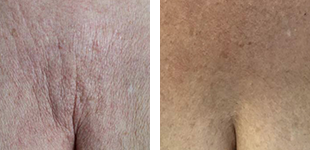Why do women experience hair loss around menopause?
Hair loss during menopause is a common issue for many women, and it occurs due to a combination of hormonal changes, genetics, and other factors. The primary reasons women lose hair at menopause include:
1. Hormonal Changes
- Decline in Estrogen and Progesterone: Estrogen and progesterone are hormones that help keep hair in the growing phase. During menopause, the levels of these hormones drop, which can slow down hair growth and lead to thinner hair.
- Increase in Androgens: With the decline of estrogen, there is often a relative increase in male hormones (androgens), particularly dihydrotestosterone (DHT). DHT can shrink hair follicles, leading to hair thinning and hair loss (a condition known as androgenic alopecia or female pattern hair loss).
2. Genetics
If hair loss runs in the family, women are more likely to experience hair thinning or loss during menopause. Genetic predisposition can make the hair follicles more sensitive to hormonal changes, exacerbating hair thinning.
3. Stress
Menopause can be a physically and emotionally stressful time. Chronic stress increases the production of cortisol, a hormone that can trigger or exacerbate hair loss (telogen effluvium).
4. Nutritional Deficiencies
As women age, they may experience nutrient deficiencies, especially in iron, vitamin D, B vitamins (like biotin), and zinc. These nutrients are important for maintaining healthy hair, and their deficiency can contribute to hair loss. We have a variety of vitamins that can be injected into the body directly for maximum absorption because they bypass the gut which can sometimes be inflamed and prevent absorption.
How does PRP help with hair growth in menopause?
Platelet-rich plasma (PRP) therapy has gained popularity as a treatment for hair loss, particularly for conditions like androgenic alopecia (male and female pattern baldness). PRP therapy involves using a concentrated solution of platelets derived from the patient’s own blood to stimulate hair regrowth. Here’s how PRP helps with hair regrowth:
1. Stimulation of Hair Follicle Activity
- PRP contains a high concentration of growth factors, which are proteins that promote cell regeneration and healing. When injected into the scalp, these growth factors help to stimulate the activity of hair follicles, potentially encouraging dormant or weakened follicles to re-enter the growth (anagen) phase of the hair cycle.
2. Improved Blood Supply to Hair Follicles
- One key factor in hair thinning is the reduced blood flow to the scalp and hair follicles. PRP helps to improve blood supply to the follicles, providing them with more oxygen and nutrients. This nourishes the hair follicles, making them more active and encouraging stronger hair growth.
3. Prevention of Hair Follicle Shrinking
- In androgenic alopecia, DHT (dihydrotestosterone) causes hair follicles to shrink, eventually leading to thinning hair and hair loss. PRP may counteract this by promoting the survival of hair follicle cells and inhibiting the effects of DHT, slowing or preventing further hair follicle miniaturization.
4. Stimulation of Collagen and Elastin Production
- The growth factors in PRP also promote the production of collagen and elastin in the scalp. These proteins help to maintain the strength and elasticity of the scalp’s skin and tissue, creating a healthier environment for hair follicles to function and thrive.
5. Anti-inflammatory Properties
- PRP has anti-inflammatory effects, which can be beneficial for individuals experiencing scalp inflammation that may be contributing to hair loss. By reducing inflammation, PRP can create a more favorable environment for hair regrowth.
6. Activation of Stem Cells in the Scalp
- PRP is thought to activate stem cells within the hair follicles, which can help “wake up” dormant or resting follicles. This activation may result in the growth of new hair strands and an increase in hair density.
If you are interested in learning more about how you can help your hair growth during menopause, schedule your consultation now.
The post Menopause and Hair Loss appeared first on Kormeili, Tanya (drkormeilidermatology.com).
n
Dr. Tanya Kormeili is a nationally recognized, board-certified dermatologist and Clinical Professor of Dermatology at UCLA’s David Geffen School of Medicine. With prestigious training and extensive experience in both medical and cosmetic dermatology, she is renowned for her expertise in skin cancer treatment, laser and surgical procedures, and advanced aesthetic care. An accomplished researcher and frequent speaker, Dr. Kormeili has contributed groundbreaking work to dermatology literature and earned numerous international awards for her clinical excellence. Dedicated to educating patients and advancing the field, she combines cutting-edge science with a personalized approach to help every patient achieve healthy, radiant skin.






